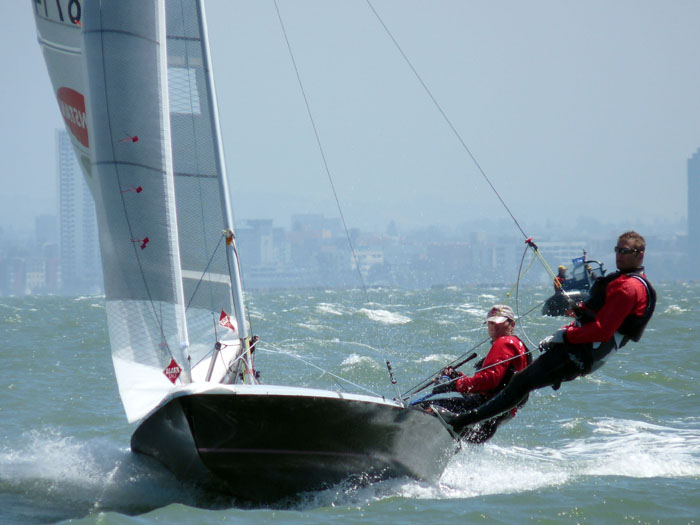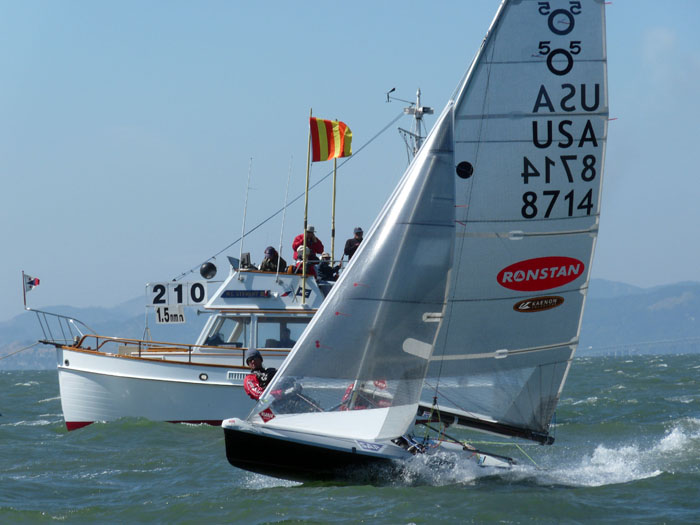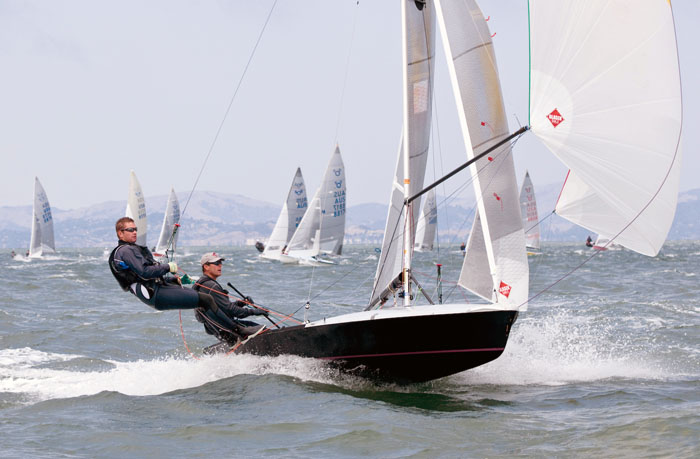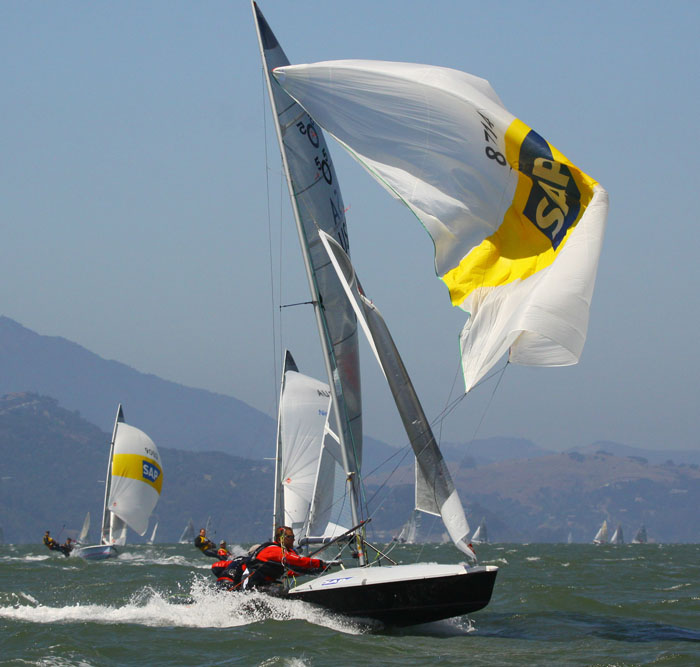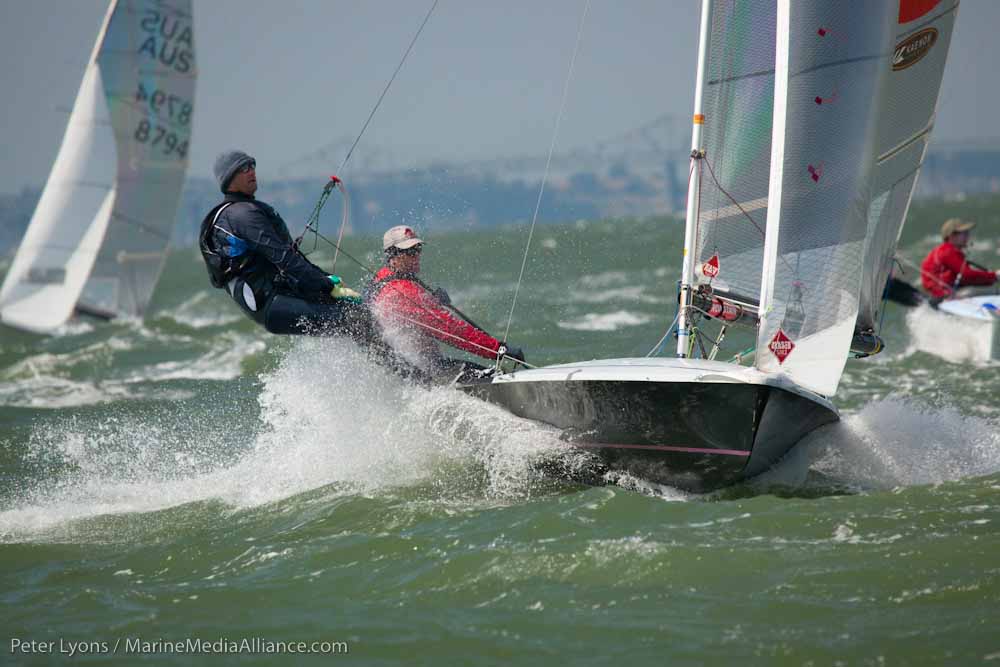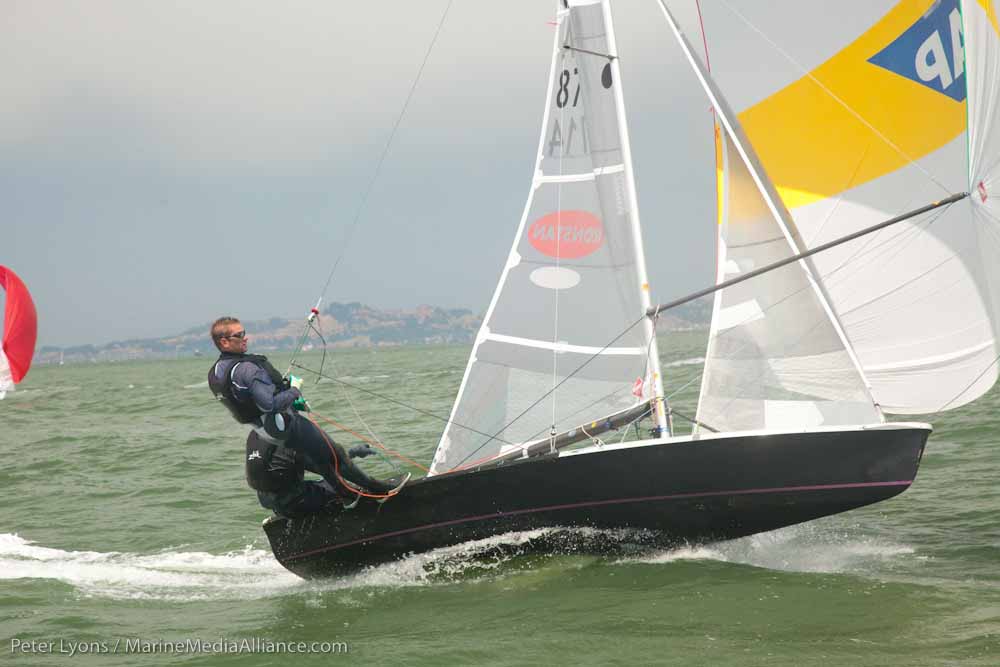By Andrew Buttner, Sailing World, October 21, 2009
The full interview with the reigning 505 world champion continued from Starting Line in our November/December 2009 issue

Ten years after winning the 505 World Championship crewing for Howie Hamlin, Mike Martin won it again, this time as skipper. The 44-year-old's crew for the 2009 event, which took place in San Francisco, was fellow Newport Beach, Calif., resident Jeff Nelson.
Is it more fun crewing or driving a 505?
Both are fun and challenging, but in totally different ways. With driving, your actions obviously have a direct impact on the speed of the boat. For this reason, you have to concentrate really hard on doing a few tasks extremely well. With crewing, you have to be thinking about everything: sail trim, where the pressure is on the course, how you are positioned relative to other boats, and all of the numerous other things that are going on while sailing a 505. Of course the best part about crewing is that you don't have to hike!
What are the key skills that
Jeff Nelson brings to the table?
I've always said the most important part of 505 sailing is finding a
good crew. This is never more true than when sailing in San
Francisco. I can?�ot see anything due to the waves and spray coming
off the boat, so I rely on Jeff to be my eyes. The crew is really
the only one in the boat who can make calls about boat traffic, wind
shifts, and laylines. So obviously, Jeff is an extremely important
member of the team. Just look around the boat park at a major 505
regatta and it is clear that the talent in the front of the boat is
equal or better than what is in the back.
Any thoughts of a return to the
front of the boat?
Not likely! I crewed for Mike Holt one day this spring and I was
awful. I would have a long way to go to get back to Worlds-winning
crew form.
You and Jeff have been sailing together for 10 years and I heard you say that this was a real advantage in San Francisco. Why is that?
The conditions in San Francisco really challenged a team's boat handling. It was critical to have a high level of trust and confidence in each other so that the maneuvers are not tentative. Plus, it is really hard to communicate in those conditions, so knowing each other's actions and reactions really pays off. For example, when it is time to tack, neither of us actually says anything, we just tack in sync.
What specifically are you looking for from the crew to help make your job of driving the boat easier?
Jeff does a lot. First, Jeff keeps the boat flat, whatever the conditions. Next, he makes sure the boat is generally set up correctly at the beginning of every leg. He then paints a verbal picture of the race course and lets me know what the general game plan is. He provides the information so we can make the right decisions. He also lets me know what velocity changes are coming down the pipe and if we have any traffic issues. Basically, he takes care of everything so that I can concentrate on starting, driving and trimming the main.
Looking at the pictures coming out of San Francisco, the breeze was up, and you and Jeff were just always launched. How did the conditions affect the communication between the two of you and how did you compensate?
Communication was extremely difficult, not just because of the conditions, but because of the two helicopters buzzing the fleet as well. We would just have to yell really loudly and give confirmation that information was heard and understood. This is where all of our time on the water as a team really paid off.
You were a great skipper (Laser and Finn class) before you began crewing in the 505, but how did your experience on the wire help you as a skipper?
The value of the time I spent on the wire is immeasurable. From the wire, you can feel things that you cannot while driving. Ask any crew and they will tell you about all those little things skippers do that cost a few boat lengths here and there! Through my time on the wire, I am aware of those things and make a conscious effort to avoid them. Having that experience has been a huge advantage.
Any "Yeah, I've been there? moments?
Of course. Understanding what the crew is going through is another advantage of having spent time on the wire. One of the harder things I found when crewing was making the tactical call to go one direction or another. It is impossible to call correctly 100% of the time. Having been there helps in keeping cool and focused on advancing from whatever position you find yourself in.
Physically the back of the boat is a very different position. How were you able to adjust so well?
Obviously, the crew in a 505 is normally much bigger than the skipper � both taller and heavier. I knew when I made the switch that I was going to be one of the bigger skippers. I had to drop 25 pounds and regain my hiking muscles from my Laser and Finn days. My workouts switched to being more aerobic-focused with less time in the gym and more time spent climbing hills on my mountain bike. It has taken a lot of work and a ton of hours on the water to be able to drive the boat effectively while hiking hard. I think one very overlooked aspect of driving a 505, especially in breeze, is the amount of upper body strength needed to play the main correctly. Everyone thinks the heavier teams are better in breeze due to weight, but it often is more the strength than the mass. We were far from the biggest team at the event, but I believe that we were the quickest because we were able to work the boat so much harder.
How hard was it to lose the weight?
I was actually looking forward to losing the weight! Between Finn sailing and crewing on the 505, I had been trying to gain weight for the previous 12 years. I was actually psyched to not have to force feed myself 5 times a day. My natural weight is around 180, and my target driving weight is 175. That is a much easier target for me to reach than the 200 pound target when I was crewing.
Speaking of being in shape, this past World Championship really rewarded those who put some time in at the gym. What did you and Jeff focus on leading up to this event?
The best workout for 505 sailing is 505 sailing. When we could not do that, the mountain bike is the next choice. I only go to the gym in the winter when it is too dark to do anything else outside.
Both you and Jeff have jobs outside of sailing and my guess is you face the same challenges as most of us in balancing life on and off the water. How do you guys balance things and what advice would you give to other teams out there?
It was pretty unbalanced this year. I am an engineer and Jeff works for Ullman Sails. We spent every spare moment outside work prepping ourselves and the boat for the worlds. Everything else was pretty much on hold. Luckily Jeff is single and I have the world's most supportive wife. I would like to take this opportunity to thank Stephanie for being so understanding.
What advice do you have to crews out there that are now calling up their skipper asking to switch roles?
I recommend switching positions occasionally in practice or even at a light air regatta. Knowing what is going on in the other end of the boat is extremely valuable. Most teams cannot seriously consider doing this in big events due to the size disparity. I am lucky to be somewhere in between the target sizes for skippers and crews. If you are considering changing positions, realize that it is a big change, so expect it to take some time to become proficient and ensure that you are in the right physical shape for the job.
Has Jeff approached you on this yet?
He has not. We have switched positions a few times and he quickly comes to the conclusion that it is more fun to crew!
Any thoughts of a return to the front of the boat? Now, no one has won the 505 worlds as a crew AFTER winning it as a skipper.
Not likely! I crewed for Mike Holt one day this spring and I was awful. I would have a long way to go to get back to Worlds-winning crew form.
Mike, congratulations again on a truly great accomplishment. Thank you for sharing some insights with us, and best of luck in the years to come.









